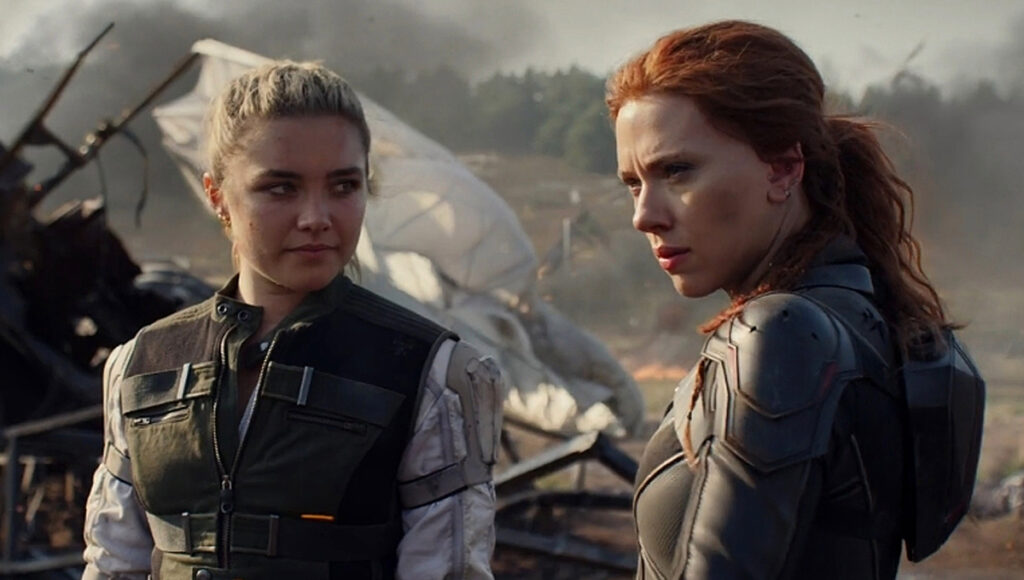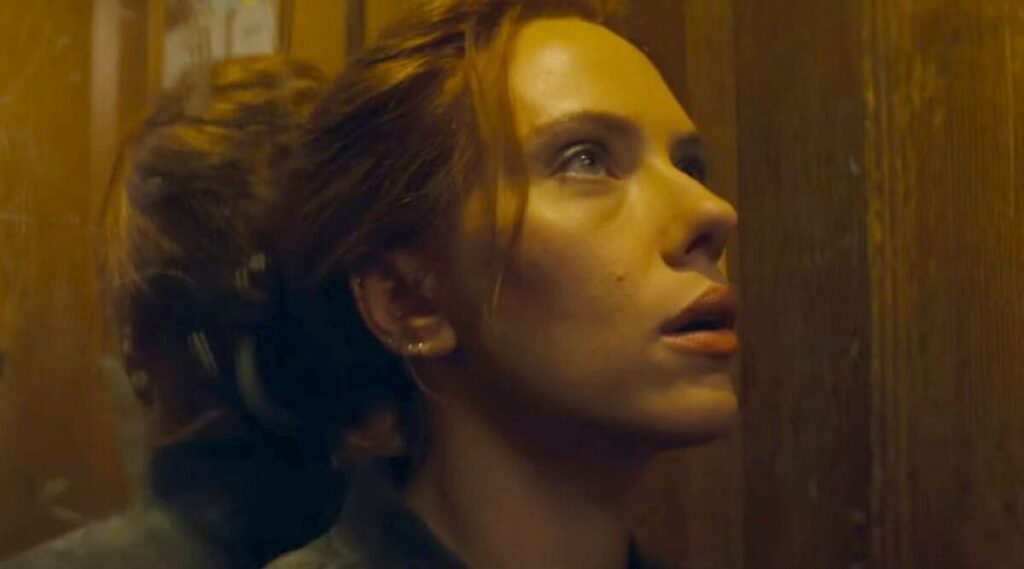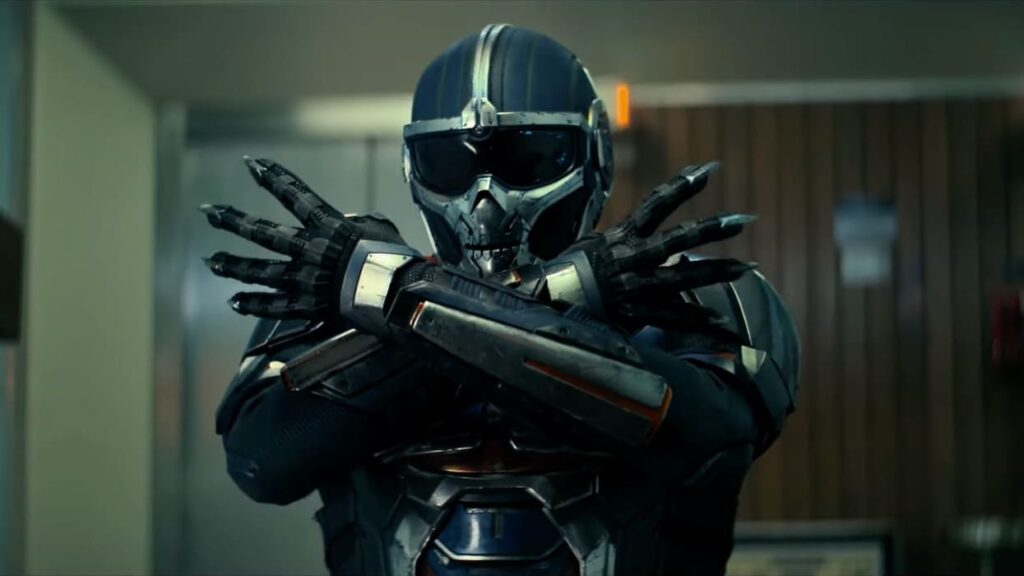After eleven years and appearances in eight films, the Marvel Cinematic Universe finally allows Scarlett Johansson’s Black Widow to helm her own movie. Director Cate Shortland’s standalone Black Widow finds its titular heroine on the run, a fugitive from the law following what transpired in Captain America: Civil War. Natasha Romanoff (Johansson) is lying low and mourning the break-up of her chosen family – with a winning combo of ice-cream, sweats, and Moonraker – when she discovers a package from her long-lost “sister” Yelena Belova (Florence Pugh).

Its contents immediately make her the target of masked killing-machine Taskmaster, and she is once again made to flee. With a return to Budapest (pronounced Buda-pesht, Natasha corrects) and a less-than-idyllic sisterly reunion, the Black Widow is forced to confront her traumatic history when she learns that the Red Room, the trafficking organisation that took her as a child and turned her into a brainwashed assassin, is very much still standing.
The meat of the story is about Natasha picking up her relationships with her old Russian sleeper-cell unit and making peace with her past. Together, the Jennings-in-spandex team sets out to take down the Red Room and its overseer, General Dreykov (Ray Winstone), once and for all.
From the beginning, Shortland makes clear Black Widow won’t be the usual Marvel fare. Opening on a sun-soaked suburban street in 1995 Ohio, she quickly establishes the deliberate and character-driven tone that promises a film about Natasha first, and the Widow second. Its spy thriller roots also lend Black Widow shades of Jason Bourne and Mission Impossible, with a gorgeous opening credits sequence built around a moody cover of ‘Smells Like Teen Spirit’. These all work to add texture to this standalone character study and set it apart from recent Avenger outings.
That’s not to say that it forgoes the typical beats franchise fans have come to expect. There is still plenty of spectacle, impressive action set pieces, and impeccable choreography. It’s just that Black Widow unfolds at a relatively smaller and more intimate scale than audiences are used to (though recently, WandaVision and The Falcon and the Winter Soldier have also favoured this approach).

This creates sufficient space for both the development of Johansson’s character and the introduction of others, without choking the narrative. David Harbour is wonderfully entertaining as Alexei Shostakov/the Red Guardian, the Soviet Union’s crimson-clad answer to Captain America. Self-absorbed yet endearingly obtuse, he provides an effective counterpoint to Rachel Weisz’s less-knowable Melina Vostokoff, a Red Room alum and scientist who plays things close to the vest. Indisputably however, Pugh is this film’s scene-stealer. The actress gives an outstandingly vibrant performance as the cynical, sneering, yet emotionally bruised Yelena, whose relationship with Natasha proves to be Black Widow’s beating heart.
Of course, this is Natasha Romanoff’s film, and Johansson explores new facets of the character with both determination and vulnerable warmth. Black Widow is about humanising the first female Avenger, a character badly served by a franchise which, year after year, objectified and tokenised her. Johansson herself recently called out Iron Man 2 for hypersexualising Natasha and treating her as just a “piece of ass”. What followed was not much better: in The Winter Soldier, one of the films in which she’s given the most to do, she is still painted as a seductress and made to flirt with Steve Rogers; in Avengers: Age of Ultron, she is passed over as a calming influence and love interest for Bruce Banner, and describes herself as a “monster” for having been forcibly sterilised. Then in Avengers: Endgame, Natasha is unexpectedly killed off without the courtesy of an on-screen funeral.

Black Widow clearly sets out with the intention to right these wrongs. It’s a two-pronged effort: through the narrative, and the characterisation. In light of that, the film’s story grapples with human trafficking, women’s lack of ownership over their own bodies, and sisterhood. And though the latter is successfully executed, Black Widow falters trying to deal with the other themes. It’s clear that the film wants the gravitas and authority that come with real-world political relevance, but it lacks the vocabulary or determination to give these issues the depth and attention they warrant.
On the other hand, granted, there is some progression for Johansson’s character. The film explores her relationship to her family, grants her a redemptive arc, and reveals more of her past, but the character is still never properly fleshed out. And that’s because Black Widow is technically redundant – audiences know what happens before and after, as well as the character’s fate. Shortland and co-writers Jac Schaeffer and Ned Benson are thus obliged to colour within the lines of Natasha’s pre-established biography, filling in what they can, but the depth of her characterisation is, by the film’s very nature, limited.
Sure enough, with a top-shelf cast, technically excellent cinematography and imaginative action pieces, assured direction and compelling tone, there’s a lot to enjoy about Marvel’s latest offering. And yet, while Black Widow is a valiant attempt to do right by the ex-spy and Avenger, it’s ultimately too little, too late. Natasha Romanoff deserved better from the MCU.
Black Widow releases in UK cinemas July 7th, and worldwide on Disney+ July 9th.
